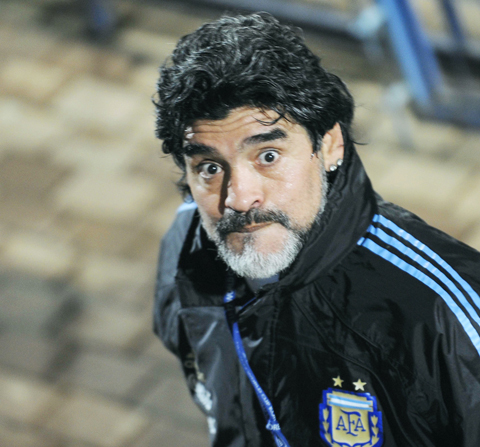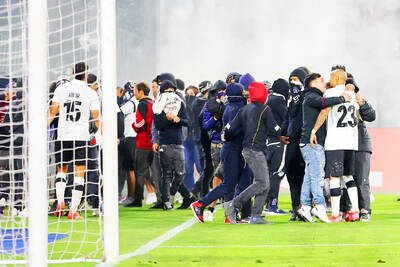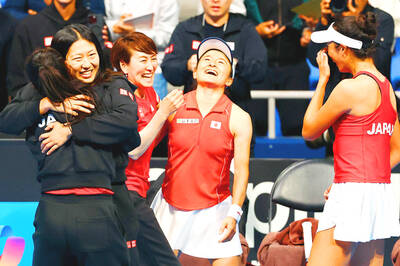The World Cup proved that Diego Maradona is no coaching genius, but nor was he the clown that some expected.
True, there were times when it wasn’t possible to observe the Argentine coach without humming the theme tune to The Benny Hill Show.
Picture, for example, the Argentine training session where Maradona pretended to beat up a member of his staff and theatrically acted as a target for his players to shoot a hail of balls at. He came out of it furiously rubbing the back of his head. Ho-ho, what a jester.

PHOTO: AFP
As Argentina’s victories piled up, however, there seemed to be method in Maradona’s madness. No other team had Argentina’s swashbuckling flair. With Gonzalo Higuain and Carlos Tevez slotting in goals and World Player of the Year Lionel Messi supplying inspiration, passes and even leadership on the field, it was possible to ignore the holes in Maradona’s defense and midfield, and not second-guess his decision to leave defender Javier Zanetti and midfielder Esteban Cambiasso at home.
Maradona’s strategy, if it can be called that, was to outscore not shut out opponents.
“Permanently on the attack” is how he lovingly described Argentina’s style of play.
“We are here to give joy to the Argentines, to play as we like, in the way which makes us happy,” he said.
What fun, but naive too.
Maradona used enthusiasm to compensate for his inexperience as a coach. He smothered his players with hugs and kisses, before and after games, because he had little else to offer in terms of tactical wizardry. The instructions he barked in practice were of the “come on,” “look alive,” variety, not useful nuggets of strategic insight.
He talked about the need for “sacrifice, blood and courage” from players, not about playing formations. His players, in turn, praised the value of his experience of having competed in four World Cups, not his game plans — if, indeed, there were any.
“Nobody ever told me where to play. So, I shouldn’t have to tell Messi where to play either,” Maradona said in the best example of his let-them-get-on-with-it approach.
He made no apologies for it. In fact, after three group-stage wins, he was demanding apologies from critics who had predicted that Argentina could only flop with the former cocaine addict in charge and waste their best chance in years of winning the World Cup.
“I’m not suggesting you drop your trousers, but it would be honest and great,” Maradona said.
The upside of Maradona hogging the limelight in South Africa with his large personality and entertaining, provocative press conferences was that he deflected attention from Messi and why the star forward wasn’t scoring.
The downside for Argentina was that Maradona failed, as he also did in World Cup qualifying, to make the most of Messi’s goal-scoring abilities. Too often, Messi was starved of the passes that help to make him such a match-winner for his club, Barcelona. That forced Messi to go hunting deep in the midfield himself for the ball.
Because of Argentina’s inbuilt defensive frailties and Maradona’s lack of alternate plans for when his plan A — attack, attack, attack — failed to work, there was always the suspicion that Argentina’s exciting adventure could slam into the buffers if the forwards couldn’t score. Yet few suspected that Argentina and Maradona would be found out quite so starkly as they were by Germany in the quarter-finals.
German manager Joachim Loew is his own greatest admirer, but it is also true that he thoroughly outthought Maradona, executing his game plan brilliantly — just as he did against the England side of Fabio Capello, a coach more experienced than Maradona.
Messi’s attacking runs broke against the rocks of a dogged, organized German defense, while the Argentine defense and Javier Mascherano in midfield were overwhelmed by the speed of the German forays.
Most importantly, the Germans played as a well-oiled team, finding each other with just the right pass at just the right time.
Argentina, in contrast, looked like talented individuals who just happened to be wearing the same blue and white stripped jerseys. As the German goals mounted up, it grew increasingly clear that Maradona had no answer. He looked so sad on the touchline.
This World Cup would not have been as much fun without Maradona, without the sight of him pacing up and down as though he were still out on the field kicking every ball, living every emotion, but it was always too much to expect that he would be the same genius as a coach as he was as Argentina’s greatest player.

Two people died on Thursday after fans and police clashed outside the Estadio Monumental in Santiago ahead of a game in South America’s Copa Libertadores, Chilean authorities said. The fatalities happened shortly before the match between Chile’s Colo-Colo and Brazilian club Fortaleza, when police blocked about 100 fans when they attempted to enter the stadium. There were conflicting accounts of how the fatalities occurred, with local media reporting that one of the dead was a 13-year-old boy. The other victim was an 18-year-old woman, according to a relative at the hospital where she was treated. The fans died after being caught underneath a

College basketballer Kaitlyn Chen has become the first female player of Taiwanese descent to be drafted by a WNBA team, after the Golden State Valkyries selected her in the third and final round of the league’s draft on Monday. Chen, a point guard who played her first three seasons in college for Princeton University, transferred to the University of Connecticut (UConn) for her final season, which culminated in a national championship earlier this month. While at Princeton, Chen was named the Ivy League tournament’s most outstanding player three times from 2022 to last year. Prior to the draft, ESPN described Chen as

College basketballer Kaitlyn Chen (陳凱玲) has become the first player of Taiwanese descent to be drafted by a WNBA team, after being selected by the Golden State Valkyries in the third and final round of the league's draft yesterday. Chen, a point guard who played her first three seasons in college for Princeton University, transferred to the University of Connecticut (UConn) for her final season, which culminated in a national championship on April 6. While at Princeton, Chen was named the Ivy League tournament's most outstanding player three times from 2022 to last year. Prior to the draft, ESPN described Chen as a

Japan yesterday secured a second consecutive Billie Jean King Cup finals appearance with a 2-1 win over 2023 champions Canada, thanks to Ena Shibahara and Shuko Aoyama’s 6-3, 5-7, 6-2 win over Kayla Cross and Rebecca Marino in the qualifying doubles decider. Shibahara and Aoyama powered through the opening set 6-3, breaking twice for a quick 3-0 lead. Cross and Marino hit back in the second, edging it 7-5 to level the match, before the Japanese pair regained control in the third. Canada’s 18-year-old Victoria Mboko edged Shibahara 6-4, 6-7 (8/10), 7-5 in a marathon opening clash. Mboko fired eight aces to